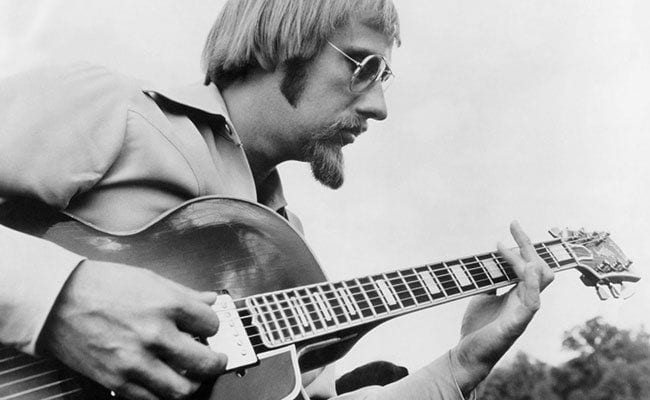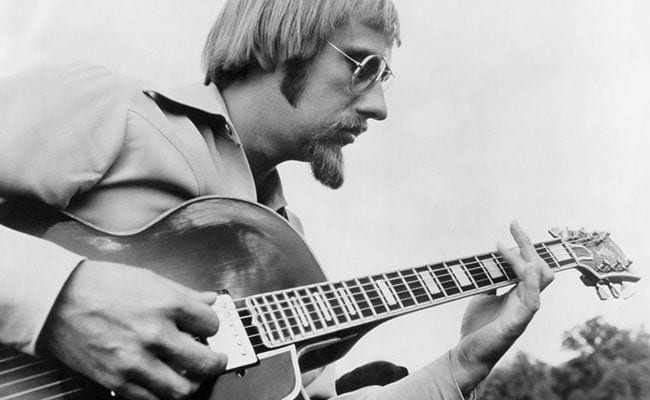
Outside of a select group of ardent crate diggers, sample buffs, obscure funk junkies and perhaps a handful of non-resident Detroit music aficionados, the name Dennis Coffey likely doesn’t mean a whole lot. Much like his fellow studio musicians in the legendary Funk Brothers, Coffey — himself often finding his guitar skills in demand at Motown — can and has been heard by a population far greater than that which can identify him by name.
Ever heard Chairman of the Board’s “Give Me Just a Little More Time”? How about Freda Payne’s “Band of Gold”? “Someday We’ll Be Together”, Diana Ross and the Supreme’s chart-topping single from 1969? He’s there, on all three and much more. Heck, he even made time to have a hit of his own with “Scorpio”, a track that’s been sampled by everyone from Rage Against the Machine to Public Enemy to Queen Latifa to Moby.
In other words, Dennis Coffey is one of the many unsung journeymen who have provided the soundtrack to our daily lives with little to no name recognition beyond those of a devoted few. That is a shame, given his skills on the guitar and his ability to turn funk on its ear while defying any racial, social or cultural lines associated therein. As with most musicians of Coffey’s ilk, music is music, and if you can play, it doesn’t matter the color of your skin. The fact that he would go on to become one of the few white session players at Motown is a testament not only to this notion but Coffey’s undeniable talent.
That makes a collection like Hot Coffey in the D: Burnin’ at Morey Baker’s Showplace Lounge such an intriguing release. A previously unreleased live set recorded during Coffey’s studio cat prime would seem something of a holy grail for beat heads the world over. And while there are certainly irrefutably funky moments scattered throughout — just try to sit still during opening track “Fuzz” — much of the album skews more towards your typical organ-led jazz trio circa 1968, the year in which these performances were captured. And yes, you read that correctly: while Coffey’s name is on the marquee, it’s organist Lyman Woodard who mostly dominates the proceedings.
Himself a member of the Motown sphere of session players, Woodard (who passed away in 2009 at the age of 66), was more of a straight-ahead jazz player and sounds every bit just that. His approach to the Hammond B-3 throughout, while heavy on the funk end of the rhythmic spectrum, owes more to players like Jimmy Smith in its jazzier elements. Coupled with powerhouse drummer Melvin Davis, the trio functions better as a vehicle for the late Woodard than Coffey himself. And that’s something of a surprise, considering the collection’s implication of this being a Coffey-fronted affair, as well as the fact that both Woodard and Davis played on Coffey’s debut solo release, Hair and Thangs, also recorded in 1968.
All of this is but a minor quibble when looked at in the face of the performances themselves. Regardless of whose name appears at the top of the bill, Hot Coffey in the D offers seven fine readings of tunes ranging from jazz standards (“Maiden Voyage”) to pop hits (“By the Time I Get to Phoenix”) to straight gospel (“Wade in the Water”), all of which provide ample opportunity for each musician to stretch out beyond the structures of the day gigs as studio pros. Indeed, “The Look of Love” is expanded to a near breaking point at almost 12 minutes of melodic permutations, exploratory grooves and a surprising amount of shredding by both Coffey and Woodard. In all, it’s a fine example of the multi-faceted meeting points of otherwise disparate styles performed by musicians capable of making each their own.
As a historical document of a vibrant era in the history of Detroit music, Hot Coffey in the D is an unimpeachably important series of recordings. As an introduction to the work of Dennis Coffey, however, newcomers are urged to check out his solo studio albums to better gain an appreciation of his greatness before returning to Hot Coffey in the D. Think of it as more of an advanced studies course than an introductory primer those new to Coffey will require. Those ready to take the master class will find themselves with plenty of satisfyingly psychedelic, funky riffs to be had from the iconic Detroit guitarist.


![Call for Papers: All Things Reconsidered [MUSIC] May-August 2024](https://www.popmatters.com/wp-content/uploads/2024/04/all-things-reconsidered-call-music-may-2024-720x380.jpg)



